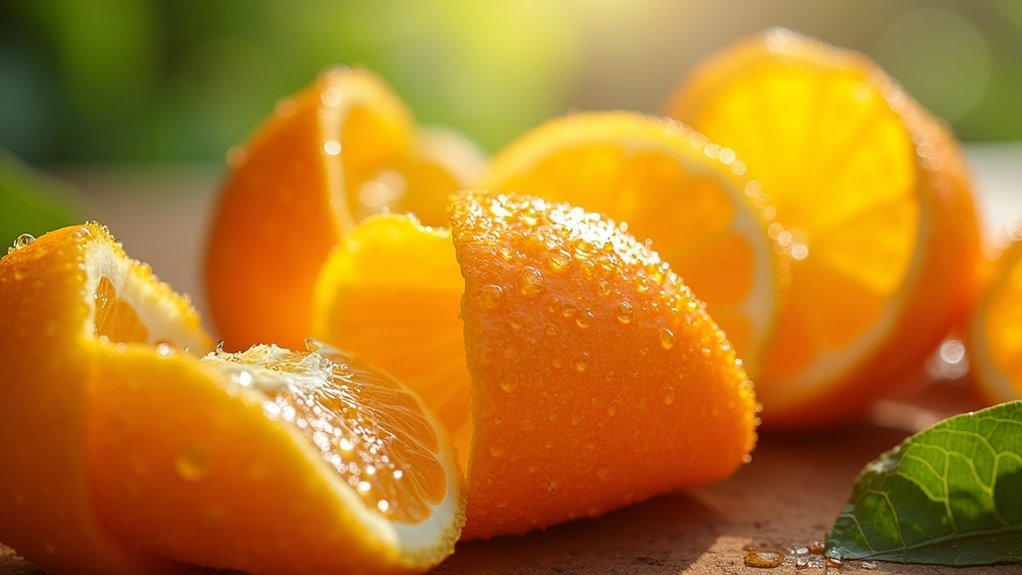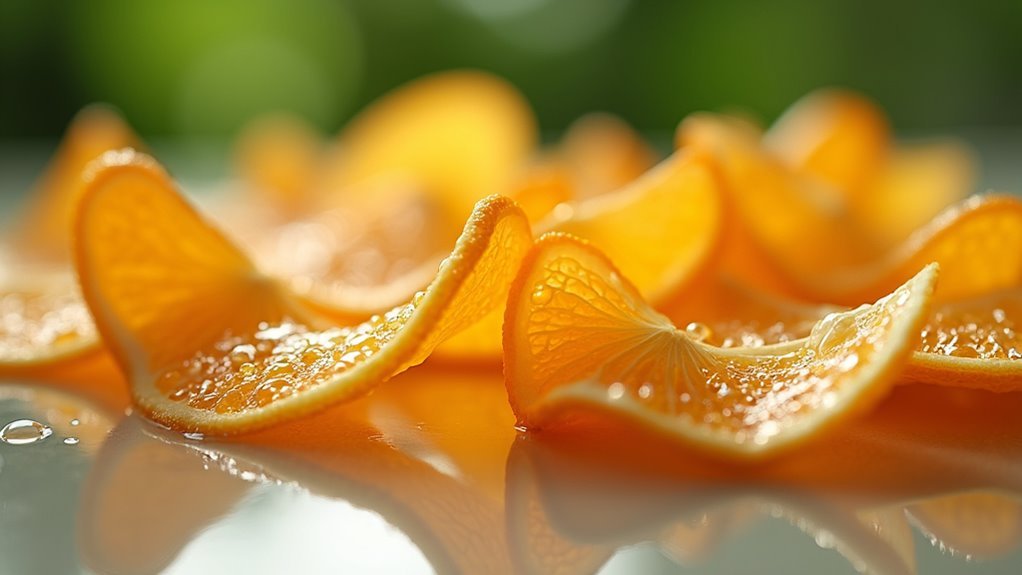You can harness citrus peels for mosquito control through three effective techniques. First, extract volatile oils from peels through hydro distillation—achieving up to 88% repellency within 60 minutes of application. Second, create citrus peel infusions that disrupt larval development, targeting mosquitoes before they mature. Third, prepare direct spray treatments using essential oils from orange peels, which prove more potent than synthetic alternatives. These eco-friendly methods transform kitchen waste into powerful pest control solutions, and there’s much more to discover about optimizing each technique.
Volatile Extract Application as Natural Repellent

As the demand for eco-friendly pest control solutions grows, citrus peels emerge as a promising natural alternative to synthetic mosquito repellents.
You’ll find that essential oils from citrus peels contain powerful molecular constituents, particularly limonene, which drives their mosquito repellent activity. The extraction process yields 0.5–3.0 grams of oil per kilogram of peels, making it an efficient source for natural mosquito repellents.
When you apply these volatile extracts, you’ll notice peak mosquitocidal activity occurs around 60 minutes after application.
Citrus sinensis demonstrates exceptional effectiveness, achieving up to 88% repellency against certain mosquito species.
Citrus Peel Infusion for Larval Disruption
While adult mosquito control represents one approach, targeting larvae at their breeding sites offers a proactive strategy that can dramatically reduce mosquito populations before they mature. You’ll find that citrus peel infusions provide exceptional larval disruption through their concentrated essential oils. These eco-friendly solutions demonstrate remarkable mosquitocidal activity against Aedes aegypti and similar species.
| Citrus Variety | Insecticidal Potency |
|---|---|
| Citrus sinensis (Orange) | Highest effectiveness |
| Citrus aurantifolia (Lime) | Moderate effectiveness |
| Citrus limon (Lemon) | Good effectiveness |
| Citrus paradisi (Grapefruit) | Variable effectiveness |
| Mixed citrus peels | Enhanced effectiveness |
When you prepare these infusions using hydro distillation, you’re extracting bioactive compounds that disrupt larvae development. This sustainable mosquito control method transforms citrus industry waste into powerful natural insecticides, offering you an environmentally responsible alternative to synthetic chemicals.
Direct Spray Treatment for Adult Mosquitoes

Beyond targeting larvae in breeding sites, direct spray treatments offer you an immediate solution for controlling adult mosquitoes already in flight.
You can extract essential oils from citrus peels, particularly Citrus sinensis, to create powerful insecticidal sprays that effectively eliminate adult mosquitoes. This eco-friendly approach provides a natural repellent that’s considerably more potent than synthetic alternatives.
When you apply these citrus-based treatments, you’ll notice increased activity against mosquitoes after 60 minutes compared to 30 minutes.
Citrus sinensis demonstrates superior insecticidal properties over other varieties. You can extract approximately 9 ml of oil from 7 kg of peels, making this an efficient waste-to-resource conversion.
This mosquito control method reduces environmental pollution while maintaining effectiveness against adult populations.
Frequently Asked Questions
Does Citrus Peel Repel Mosquitoes?
Yes, you’ll find citrus peels effectively repel mosquitoes with up to 88% success rates. They contain limonene, which provides natural insect-repelling properties, making them an eco-friendly alternative to synthetic repellents you’d typically use.
Does Citrus Really Repel Mosquitoes?
Yes, citrus really repels mosquitoes. You’ll find that citrus essential oils, especially limonene, effectively deter mosquitoes with up to 88% success rates. Sweet orange peels work best, offering you an eco-friendly alternative to chemical repellents.
How to Make Mosquito Repellent Using Orange Peels?
Cut fresh orange peels into small pieces, then steam distill them to extract essential oils. You’ll get about 9ml from 7kg of peels. Mix the extracted oil with carrier oil or alcohol for spraying.
What Is the Most Effective Homemade Mosquito Repellent?
You’ll find citrus peel essential oils most effective for homemade mosquito repellent. Steam-distill orange or lime peels to extract limonene-rich oils, then dilute with carrier oil for 88% repellency rates.
In Summary
You’ve now discovered three effective ways to harness citrus peels against mosquitoes. Whether you’re creating volatile extracts for personal protection, brewing infusions to target larvae in standing water, or preparing direct sprays for immediate adult mosquito control, you’re equipped with natural alternatives to chemical repellents. Don’t underestimate these simple household scraps – they’re powerful tools in your mosquito management arsenal that’ll help protect your outdoor spaces.





Leave a Reply